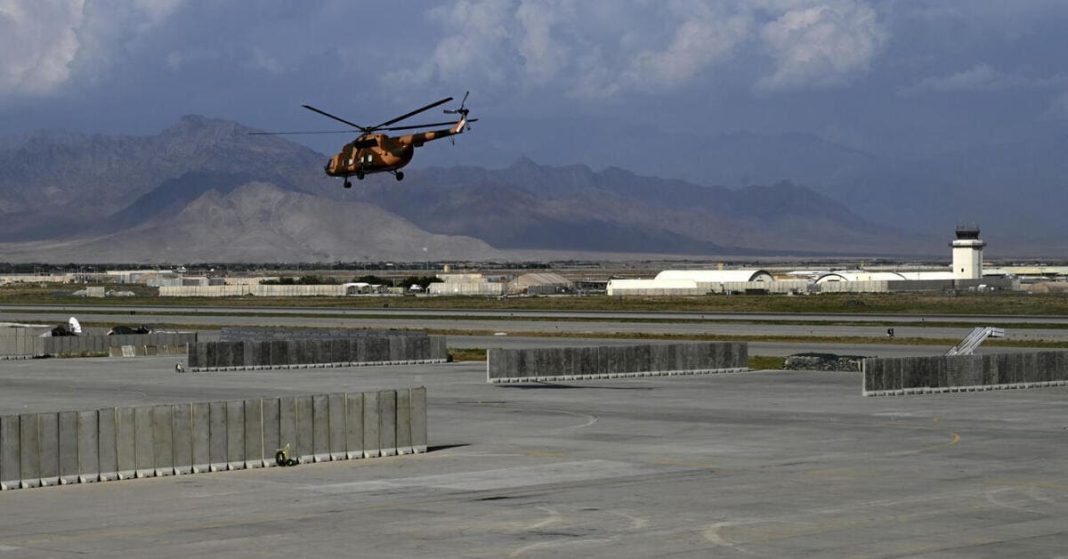Once a hub of American forces, Afghanistan has firmly rejected the demands of US President Donald Trump to return Bagram Airfield. The refusal has stirrwd tensions that can potentially affect China and Pakistan.
The refusal comes after Trump warned Taliban of “bad things” if the base was not returned “right away”. The recent exchange of fiery statements is the first sharpest confrontation between the US President and Taliban leadership since Washington’s 2021 withdrawal. Taliban are repeatedly referring to the 2020 Doha Agreement, which mandated the US withdrawal from Afghanistan, to justify their refusal.
President Trump has pressed on the importance of Bagram Airfield for US in past few statements. “We’re trying to get it back because they need things from us,” Trump said of the Taliban.
“But one of the reasons we want that base is, as you know, it’s an hour away from where China makes its nuclear weapons,” Trump said. “So a lot of things are happening.”
Stressing on the importance of the Bagram airfield to journalists on Air Force One, Trump said: “One of the most powerful bases in the world in terms of runway strength and length,” he said. “You can land anything on there. You can land a planet on top of it.”
.@POTUS on Bagram Air Base: “We’re talking now to Afghanistan. We want it back and we want it back soon. Right away — and if they don’t do it, you’re going to find out what I’m going to do. pic.twitter.com/lL6g7A2SLU
— Rapid Response 47 (@RapidResponse47) September 21, 2025
Reacting to the statements of Trump, Zakir Jalaly, an official at the Taliban’s Foreign Ministry called for negotiation with the USA. “Afghanistan and the U.S. need to interact with each other and can have economic and political relations based on mutual respect and common interests,” Jalaly said on the social platform X. “The Afghans have not accepted a military presence in history, and this possibility was completely rejected during the Doha talks and agreement, but the door is open for further interaction.”
Trump expressed his plans to take back Bagram Air Base on September 18 during his visit to the UK. He criticized the Biden administration’s handling of the 2021 withdrawal as a total disaster and confirmed that US officials were working behind to reclaim the base. Negotiations have been underway by US Envoys Adam Boehler and Zalmay Khalilzad since March, covering issues such as hostage releases and access to Afghanistan’s $1 trillion mineral wealth.
Read more: Trump, Erdogan to revive U.S.–Turkey relations with F-35 talks
Located 40 miles north of Kabul, Bagram Airfield in Afghanistan was a strategic installation built by the Soviets and later on developed by the US. The airfield has an 11,800-foot runway capable of supporting heavy bombers. At the height of the war, it hosted around 100,000 American troops. The Taliban are now using the facility to operate captured US equipment, including aircraft, highlighting the importance and strategic weight of their refusal. China is concerned about the prospect of the US’s return to Afghanistan.
Trump: “We’re talking to Afghanistan. It should have never been given up.” pic.twitter.com/9LUFQqZRlQ
— Aaron Rupar (@atrupar) September 19, 2025
China’s Concern
China is Afghanistan’s largest trading partner. On September 19, Beijing urged constructive negotiations while privately supporting the Taliban’s stance against the US.
Chinese Foreign Affairs Ministry spokesperson Lin Jian said that China “respects Afghanistan’s independence, sovereignty, and territorial integrity.
“Afghanistan’s future should be decided by its own people,” Lin said, adding: “Stirring up tension and creating confrontation in the region won’t be popular.”
Beijing views the US presence near its western borders as a threat. According to NBC, quoting the Chicago-based nonprofit Bulletin of the Atomic Scientists, China is rapidly expanding its nuclear stockpile, the country is expected to have accumulated 600 nuclear warheads.
Analysts believe Beijing views Bagram as a direct threat to its nuclear facilities in Xinjiang, less than an hour’s flight from the base. It is also a threat to China’s goal of integrating Afghanistan into the China-Pakistan Economic Corridor.
Pakistan’s Balancing Act
Pakistan has also tightened its security along the Afghanistan border, anticipating a refugee influx if the standoff worsens. Retired Brigadier Farooq Hamid Khan warned that US re-entry could drag Pakistan into an indefinite war on terror, recalling the country’s experience of holding US intelligence outposts during the Cold War. Islamabad now faces the delicate choice to maintain its deep ties with China while resisting US pressure for logistical support and including airspaces.
Analysts warn that the crisis can affect Pakistan’s diplomatic space as it is also managing its relations with Iran and Afghanistan. Even Iran would be threatened with the US presence at the base, fearing increased increased surveillance and military operations targeting their territory.
For India, the dispute comes at a difficult moment, with India’s control of Chabahar port weakened by US sanctions. New Delhi’s access to Central Asia is already limited.
The crisis revives old fears of becoming trapped in the US-China relationship/rivalry. Managing a large airfield requires a large number of troops, hence Pakistan needs to decide if it wants to give its airspace access and bases, even a limited cooperation, which can be viewed as alignment and can hurt Pakistan’s diplomatic relations with China, as well as Iran.














